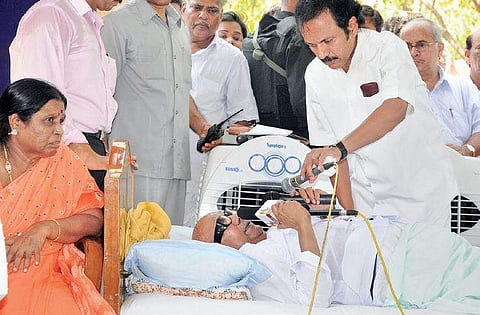

CHENNAI: The 2009 parliamentary elections took place against the backdrop of the last-stage Eelam War raging in neighbouring Sri Lanka. As tempers were running high in Tamil Nadu over the killing of a large number of civilians in the island nation, the Congress at the Centre and its ally DMK in power in State were accused of aiding the Lankan government and turning a Nelson’s eye to the Sri Lankan Tamils being butchered in hordes.
So, naturally, the burning issue was expected to deal a death blow to the DMK-Congress alliance. But, proving all speculations wrong, the alliance won 27 out of the 39 Lok Sabha seats in Tamil Nadu, facilitating the Congress-led UPA to form government at the Centre again. Three years earlier, the DMK-Congress alliance won 135 seats in the State Assembly polls.
Though the DMK having only 96 MLAs could not get a majority of its own, it formed government with support of Congress and other allies. Several DMK ministers were accommodated in the Union Cabinet, DMK leader M Karunanidhi managed not to share power with the Congress in the State. The 2006 Assembly polls also witnessed the entry of actor Vijayakanth into politics and his newly launched DMDK secured 8.32 per cent votes, though he was the lone DMDK candidate to win.
At the national level, the Left parties withdrew support to the UPA government over signing of the nuclear deal with the US. But Manmohan Singh’s government survived after a few parties such as Samajwadi Party extended support. In the 2009 parliamentary polls, the Left campaigned against UPA, especially targeting it for entering into the nuclear deal with the US.
In Tamil Nadu, AIADMK leader J Jayalalithaa took a stand supporting the Lankan Tamils and even announced that her party would help the creation of a separate nation for Tamil in Lanka.
The AIADMK formed a strong alliance with the MDMK, PMK, CPI, CPM and the BJP. MDMK’s Vaiko was one of the leaders who targeted the DMK and the Congress over the killing of Tamils in the war.
In the run-up to the polls, Chief Minister Karunanidhi went on a hunger strike and withdrew it in a few hours after assurances from Prime Minister Singh and Congress chief Sonia Gandhi that the Lanka government had declared ceasefire.
Karunanidhi faced much criticism for being hypocritical since the war was actually not halted. But when the election results came, it showed that the Sri Lankan Tamil issue did not impact the electorate.
The DMK-Congress alliance won 27 of the 39 seats. The AIADMK-BJP alliance managed to win only 12.
At the national level, the Congress won 206 seats and the UPA a total of 262 seats. The Congress-led alliance again formed the government with support of a few other parties.